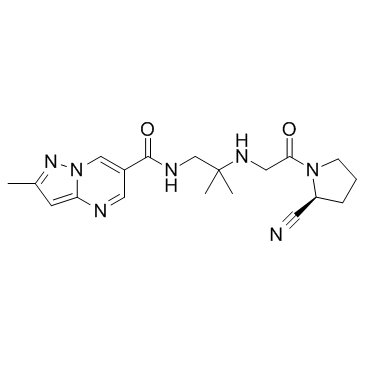Anagliptin (SK-0403) |
| Catalog No.GC31341 |
Anagliptin (SK-0403) (SK-0403) is a highly selective, potent, orally active inhibitor of dipeptidyl peptidase 4 (DPP-4), with an IC50 of 3.8 nM, and less selective at DPP-8 and DDP-9 with IC50s of 68 nM and 60 nM, respectively.
Products are for research use only. Not for human use. We do not sell to patients.

Cas No.: 739366-20-2
Sample solution is provided at 25 µL, 10mM.
Anagliptin is a highly selective, potent inhibitor of dipeptidyl peptidase 4 (DPP-4), with an IC50 of 3.8 nM, and less selective at DPP-8/9 (IC50, 68, 60 nM, respectively).
Anagliptin is a highly selective, potent inhibitor of DPP-IV, with an IC50 of 3.8 nM, and less selective at DPP-8/9 (68, 60 nM, respectively). Anagliptin does not affect CYP3A4, CYP2C19, CYP2C9, CYP1A2, and CYP2D6 (IC50 >10 μM) or CYP3A4, CYP2C8, CYP2C9, and CYP1A2 at 50 μM. Anagliptin hydrochloride does not bind to the hERG channel (E-4031, >90% inhibition at 0.1 μM, IC50 >500 μM in patch clamp using HEK 293 cells)[1]. Anagliptin (1-100 μM) dose-dependently suppresses-DPP-4-induced smooth muscle cells (SMCs) proliferation, and reduces TNF-α production in cultured monocytes[2].
Anagliptin (0.3%) alters the quantity and quality of atherosclerotic lesions in apoE-deficient mice, and reduces DPP-4 activity in the plasma, and total cholesterol level, especially VLDL and LDL-C in mice. Anagliptin also decreases α-SMA-positive area and TNF-α-positive lesions in plaque area of apoE-deficient mice. In addition, Anagliptin does not increase the number of circulating endothelial progenitor cells (EPCs) in apoE-deficient mice[2]. Anagliptin (0.3%) decreases the low-density lipoprotein cholesterol and very low-density lipoprotein cholesterol, and also reduces the sterol regulatory element-binding protein-2 messenger ribonucleic acid expression level in mice[3].
[1]. Kato N, et al. Discovery and pharmacological characterization of N-[2-({2-[(2S)-2-cyanopyrrolidin-1-yl]-2-oxoethyl}amino)-2-methylpropyl]-2-methylpyrazolo[1,5-a]pyrimidine-6-carboxamide hydrochloride (anagliptin hydrochloride salt) as a potent and selective DPP-IV inhibitor. Bioorg Med Chem. 2011 Dec 1;19(23):7221-7. [2]. Ervinna N, et al. Anagliptin, a DPP-4 inhibitor, suppresses proliferation of vascular smooth muscles and monocyte inflammatory reaction and attenuates atherosclerosis in male apo E-deficient mice. Endocrinology. 2013 Mar;154(3):1260-70. [3]. Yano W, et al. Mechanism of lipid-lowering action of the dipeptidyl peptidase-4 inhibitor, anagliptin, in low-density lipoprotein receptor-deficient mice. J Diabetes Investig. 2017 Mar;8(2):155-160.
Average Rating: 5 (Based on Reviews and 23 reference(s) in Google Scholar.)
GLPBIO products are for RESEARCH USE ONLY. Please make sure your review or question is research based.
Required fields are marked with *




















